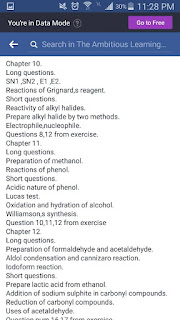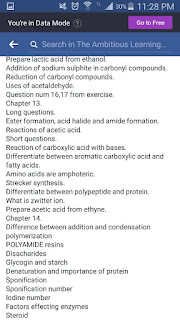Download 2nd Year (12th Class) Chemistry Guess Paper 2020
Here Your Favorite Blog PakStudyPortal is sharing a very important guess paper of Chemistry for the students of 12th class. Intermediate 2nd Year Chemistry Guess Paper 2020 all the important questions chapterwise are available on this blog for
the students of intermediate (FSc Pre-Medical and Pre-Engineering).
Chapter Wise Guess Paper Chemistry 2nd Year
Check Below 12th Class Chemistry Chapterwise Important Long and Short Questions:
Chapter One:
Position of hydrogens, oxides, hydroxide and halides
Short question.
Periods in periodic table.merits and demerits of Mendeleev,s periodic tables..
Position of hydrogens, oxides, hydroxide and halides
Short question.
Periods in periodic table.merits and demerits of Mendeleev,s periodic tables..
metallic
oxides are basics and non metallics are acidic why?
what
is lanthnide contraction.2nd electron affinity is exothermic why?.hydration
energy it’s factors?.
Amphotaric
oxides. And question number 7 – 13 from exercise.
Chapter 2:
Short question:
Discuss
solubility of sulfates and carbonates. Reaction of alkali metals with oxygen
and water. Lime mortar. How plaster of Paris is prepared from gypsum. Slacking
of lime. Alkali metals are strong reducing agent why? How K02 can be use by
mountainer? Solution of Na2Co3 is basic why?
And question number 7
And question number 7
Long question:
(b)
9
(b)
from exercises.
Peculiar
behavior of lithium.
Down cell and diaphragm cell.
Down cell and diaphragm cell.
Chapter 3:
Short question:
What is iner pairs effect. How borax is prepared by to methods.
Short question:
What is iner pairs effect. How borax is prepared by to methods.
Uses
of borax and Boric acids.
effects
of heat on borax ..
Uses
of sodium silicates.
CO2 is gas while SiO2 is solids why?
CO2 is gas while SiO2 is solids why?
Peculiar
behavior of carbons. Chemical garden.
Why
silicones are more proffered over petroleum.
What
is basic lead and lead chromates. borax bead tests. ortho boric acid is mono
basic acid why.
Chapter 4:
Short question:
What is laughing gas it is prepared.
Aqua regia.
Chapter 4:
Short question:
What is laughing gas it is prepared.
Aqua regia.
Uses
of nitric acids.
Reaction of nitric acid with bases carbon,phosphorus,sulphur,Cu , Sn. Zn
Reaction of nitric acid with bases carbon,phosphorus,sulphur,Cu , Sn. Zn
Reaction
of P2O3 and P2O5 with cold & hot water.P2O5 as dehydrating
agents.similarities and dissimilarities of sulphur and oxygen. Reaction of
sulphuric acid( All)Reaction of NO2 with water and with phosphorus .ring test.
And allotrope of phosphoru.
Chapter 5:
Short question:
Halogens are oxidizing agents why.
Short question:
Halogens are oxidizing agents why.
How
I205 can be used for quantitative analysis of C0. What is available chlorine.
Uses
of fluorines,chlorine,bromine and iodine separate .
How xenon tetra oxide is prepared. Uses of noble gases.
Question number 4 and 6 b 8 b from exercise.
Chapter 6:
How xenon tetra oxide is prepared. Uses of noble gases.
Question number 4 and 6 b 8 b from exercise.
Chapter 6:
Long question :
Properties of transition element.
Manufacture of steels.
Type of steel.
Electron chemicals theory.
Short question:
Typical and non typical transition elements.
Properties of transition element.
Manufacture of steels.
Type of steel.
Electron chemicals theory.
Short question:
Typical and non typical transition elements.
Melting
point and its trend. Binding energy and its trend paramagnetism.
why
transition elements compounds show colors. What are ligands. What is co
ordination sphere. What are chelates. Classification of steel.
Galvanizing
of zinc. And cathode coating. Chromyl chloride test. How KMnO4 is prepared by
two methods.
How
chromates are converted into dichromates. Write reactions of KMnO4 with oxalic
acid ferrous sulphate and KI
Chapter 07:
Long question:
Cracking, reforming and geometrical isomerism.
Short questions.
What is peculiar nature of carbon.
How anthracite is prepared?
What is natural gas.
What is functional group? Give examples.
Metamerism.tautomerism and functional group isomerism.
Question 15 from exercise
Chapter 08:
Acidic nature, halogenation of alkane.kolbe,s electrolytic method,
Short question:
Exercise
Chapter 9:
Long question:
Friedel Crafts reactions.
Nitration sulphanation.
Stability of benzene.
Kekule structure and points favoring it.
Short question.
Chapter 07:
Long question:
Cracking, reforming and geometrical isomerism.
Short questions.
What is peculiar nature of carbon.
How anthracite is prepared?
What is natural gas.
What is functional group? Give examples.
Metamerism.tautomerism and functional group isomerism.
Question 15 from exercise
Chapter 08:
Acidic nature, halogenation of alkane.kolbe,s electrolytic method,
Short question:
Exercise
Chapter 9:
Long question:
Friedel Crafts reactions.
Nitration sulphanation.
Stability of benzene.
Kekule structure and points favoring it.
Short question.
Differentiate
between mono and polycyclic aromatic compound.
Prepare
benzene by 2 methods specially from alkanes.
Prepare
glyoxal,oxalic acid,maliec acid benzoic acid and meta nitrochloro benzene from
benzenes.
Chapter 10:
Long question:
SN1 ,SN2 and E1 ,E2.
Reactions of Grignerd reagents.
Short question:
Reactivity of alkyd halides.
Prepare alkyl halite by two methods.
Electrophile,nucleotide.
Questions 8,12 from exercise.
Chapter 11:
Long question:
Preparation of methanols.
Reactions of phenols.
Short questions.
Acidic nature of phenol.
Lucas tests.
Oxidation and hydration of alcohol.
Williamson,s synthesis.
Question 10,11,12 from exercises
Chapter 12:
Long question:
Preparation of formaldehyde and acetaldehyde.
Aldol condensation and cannizaro reactions.
Iodoform reaction.
Short question:
Prepare lactic acid from ethanols.
Addition of sodium sulphite in carbonyl compounds.
Reduction of carbonyl compounds.
Uses of acetaldehyde.
Question num 16,17 from exercises.
Chapter 13:
Short question:
Reaction of carboxylic acid with bases.
Differentiate between aromatic carboxylic acid and fatty acids.
Amino acids are amphoterics.
Strecker synthesis.
Differentiate between polypeptide and proteins.
What is zwitter ions.
Prepare acetic acid from ethynes.
Ester formation, acid halide and amide formations.
Reactions of acetic acids.
Long question:
SN1 ,SN2 and E1 ,E2.
Reactions of Grignerd reagents.
Short question:
Reactivity of alkyd halides.
Prepare alkyl halite by two methods.
Electrophile,nucleotide.
Questions 8,12 from exercise.
Chapter 11:
Long question:
Preparation of methanols.
Reactions of phenols.
Short questions.
Acidic nature of phenol.
Lucas tests.
Oxidation and hydration of alcohol.
Williamson,s synthesis.
Question 10,11,12 from exercises
Chapter 12:
Long question:
Preparation of formaldehyde and acetaldehyde.
Aldol condensation and cannizaro reactions.
Iodoform reaction.
Short question:
Prepare lactic acid from ethanols.
Addition of sodium sulphite in carbonyl compounds.
Reduction of carbonyl compounds.
Uses of acetaldehyde.
Question num 16,17 from exercises.
Chapter 13:
Short question:
Reaction of carboxylic acid with bases.
Differentiate between aromatic carboxylic acid and fatty acids.
Amino acids are amphoterics.
Strecker synthesis.
Differentiate between polypeptide and proteins.
What is zwitter ions.
Prepare acetic acid from ethynes.
Ester formation, acid halide and amide formations.
Reactions of acetic acids.
Chapter 14:
Difference
between addition and condensation polymerizations
POLYAMIDE resins
Disacharide
Glycogan and starchs
Denaturation and importance of protein
Sponifications
Sponification numbers
Iodine numbers
Factors effecting enzymes
Steroids
Diffrentiate between DNA and RNA
POLYAMIDE resins
Disacharide
Glycogan and starchs
Denaturation and importance of protein
Sponifications
Sponification numbers
Iodine numbers
Factors effecting enzymes
Steroids
Diffrentiate between DNA and RNA
Chapter 15:
Macro and micro nutrient.
Phosphorus ki importance and pralling .
Raw materials for cements
Heating.
Macro and micro nutrient.
Phosphorus ki importance and pralling .
Raw materials for cements
Heating.
Chapter 16:
Long question.
Components of environment.
Acid rain.
Smog.
Air pollution.
DO,BOD,COD
Exercise: Q9 to Q16
Long question.
Components of environment.
Acid rain.
Smog.
Air pollution.
DO,BOD,COD
Exercise: Q9 to Q16
Read Also: 2nd Year Chemistry 12th Class Assessment Scheme 2020
Best
of Luck for 2nd Year Chemistry Students and Keep Visiting Our Blog For Effective Guess Papers.














